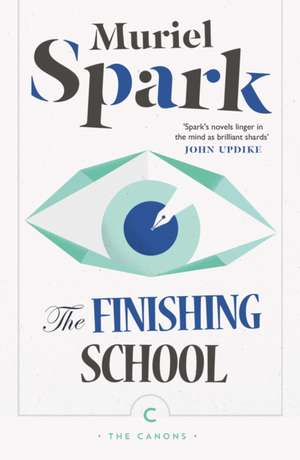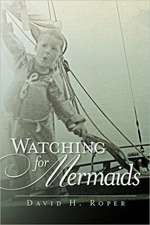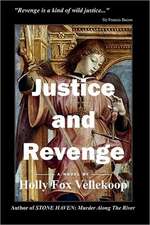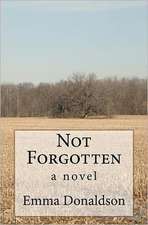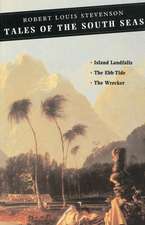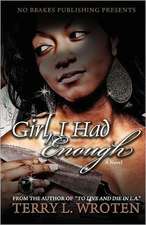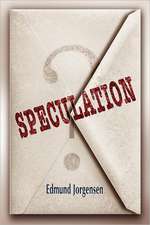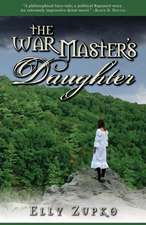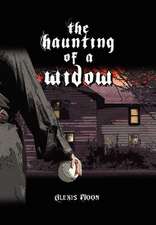The Finishing School: Canons
Autor Muriel Sparken Limba Engleză Paperback – 7 apr 2016
In The Finishing School Muriel Spark is once again at her biting, satirical best. On the edge of Lake Geneva in Switzerland, a struggling would-be novelist and his wife run a finishing school of questionable reputation to keep the funds flowing. When a seventeen-year-old student's writing career begins to show great promise, tensions run high.
A keen portrait of devouring regret, psychological unravelling and the glittering promise of youth, The Finishing School is the perfect natural partner to Muriel Spark's most famous novel The Prime of Miss Jean Brodie.
| Toate formatele și edițiile | Preț | Express |
|---|---|---|
| Paperback (2) | 62.19 lei 3-5 săpt. | +4.34 lei 7-13 zile |
| Canongate Books – 7 apr 2016 | 62.19 lei 3-5 săpt. | +4.34 lei 7-13 zile |
| Anchor Books – 31 oct 2005 | 110.69 lei 6-8 săpt. |
Din seria Canons
-
 Preț: 56.23 lei
Preț: 56.23 lei -
 Preț: 63.04 lei
Preț: 63.04 lei -
 Preț: 63.23 lei
Preț: 63.23 lei -
 Preț: 62.40 lei
Preț: 62.40 lei -
 Preț: 63.39 lei
Preț: 63.39 lei -
 Preț: 69.69 lei
Preț: 69.69 lei -
 Preț: 63.58 lei
Preț: 63.58 lei -
 Preț: 84.96 lei
Preț: 84.96 lei -
 Preț: 69.47 lei
Preț: 69.47 lei -
 Preț: 69.94 lei
Preț: 69.94 lei -
 Preț: 68.93 lei
Preț: 68.93 lei -
 Preț: 62.56 lei
Preț: 62.56 lei -
 Preț: 62.69 lei
Preț: 62.69 lei -
 Preț: 63.07 lei
Preț: 63.07 lei -
 Preț: 71.31 lei
Preț: 71.31 lei -
 Preț: 63.77 lei
Preț: 63.77 lei -
 Preț: 62.95 lei
Preț: 62.95 lei -
 Preț: 96.57 lei
Preț: 96.57 lei -
 Preț: 63.35 lei
Preț: 63.35 lei -
 Preț: 63.13 lei
Preț: 63.13 lei -
 Preț: 64.32 lei
Preț: 64.32 lei -
 Preț: 64.13 lei
Preț: 64.13 lei -
 Preț: 44.75 lei
Preț: 44.75 lei -
 Preț: 62.59 lei
Preț: 62.59 lei -
 Preț: 71.04 lei
Preț: 71.04 lei -
 Preț: 62.60 lei
Preț: 62.60 lei -
 Preț: 62.56 lei
Preț: 62.56 lei -
 Preț: 63.60 lei
Preț: 63.60 lei -
 Preț: 63.23 lei
Preț: 63.23 lei -
 Preț: 83.95 lei
Preț: 83.95 lei -
 Preț: 68.91 lei
Preț: 68.91 lei -
 Preț: 62.19 lei
Preț: 62.19 lei -
 Preț: 62.56 lei
Preț: 62.56 lei -
 Preț: 68.94 lei
Preț: 68.94 lei -
 Preț: 62.76 lei
Preț: 62.76 lei -
 Preț: 70.19 lei
Preț: 70.19 lei -
 Preț: 62.19 lei
Preț: 62.19 lei -
 Preț: 64.27 lei
Preț: 64.27 lei -
 Preț: 61.75 lei
Preț: 61.75 lei -
 Preț: 63.06 lei
Preț: 63.06 lei -
 Preț: 66.28 lei
Preț: 66.28 lei -
 Preț: 68.43 lei
Preț: 68.43 lei -
 Preț: 57.00 lei
Preț: 57.00 lei -
 Preț: 63.45 lei
Preț: 63.45 lei -
 Preț: 63.41 lei
Preț: 63.41 lei -
 Preț: 62.44 lei
Preț: 62.44 lei -
 Preț: 63.06 lei
Preț: 63.06 lei - 5%
 Preț: 65.65 lei
Preț: 65.65 lei -
 Preț: 63.06 lei
Preț: 63.06 lei -
 Preț: 62.57 lei
Preț: 62.57 lei
Preț: 62.19 lei
Nou
Puncte Express: 93
Preț estimativ în valută:
11.90€ • 12.46$ • 9.85£
11.90€ • 12.46$ • 9.85£
Carte disponibilă
Livrare economică 15-29 martie
Livrare express 01-07 martie pentru 14.33 lei
Preluare comenzi: 021 569.72.76
Specificații
ISBN-13: 9781782117575
ISBN-10: 1782117571
Pagini: 128
Ilustrații: No
Dimensiuni: 128 x 198 x 15 mm
Greutate: 0.11 kg
Ediția:Main - Canons Edition
Editura: Canongate Books
Seria Canons
ISBN-10: 1782117571
Pagini: 128
Ilustrații: No
Dimensiuni: 128 x 198 x 15 mm
Greutate: 0.11 kg
Ediția:Main - Canons Edition
Editura: Canongate Books
Seria Canons
Notă biografică
Muriel Spark, DBE, C.Litt., was born in Edinburgh in 1918 and educated in Scotland. A poet and novelist, she is most well known for The Prime of Miss Jean Brodie. She also wrote children's books, radio plays, the comedy Doctors of Philosophy and biographies of nineteenth-century literary figures, including Mary Shelley and Emily Brontë. Muriel Spark has garnered international praise and many awards, including the David Cohen Prize for Literature, the Ingersoll T.S. Eliot Award, the James Tait Black Memorial Prize, the Boccaccio Prize for European Literature, the Gold Pen Award, the first Enlightenment Award and the Italia Prize for dramatic radio. She died in 2006.
Descriere
Now available as a stunning Canon 'A work of glittering Sparkian ice, whose thinly frozen surface tempts you to jump up and down jovially above something deeper and darker' ALI SMITH
Extras
1
"You begin," he said, "by setting your scene. You have to see your scene, either in reality or in imagination. For instance, from here you can see across the lake. But on a day like this you can't see across the lake, it's too misty. You can't see the other side." Rowland took off his reading glasses to stare at his creative writing class whose parents' money was being thus spent: two boys and three girls around sixteen to seventeen years of age, some more, some a little less. "So," he said, "you must just write, when you set your scene, 'the other side of the lake was hidden in mist.' Or if you want to exercise imagination, on a day like today, you can write, 'The other side of the lake was just visible.' But as you are setting the scene, don't make any emphasis as yet. It's too soon, for instance, for you to write, 'The other side of the lake was hidden in the fucking mist.' That will come later. You are setting your scene. You don't want to make a point as yet."
College Sunrise had begun in Brussels, a finishing school for both sexes and mixed nationalities. It was founded by Rowland Mahler, assisted by his wife, Nina Parker.
The school had flourished on ten pupils aged sixteen and upward, but in spite of this flourishing, mainly by reputation, Rowland had barely been able to square the books at the end of the first year. So he moved the school to Vienna, increased the fees, wrote to the parents that he and Nina were making an exciting experiment: College Sunrise was to be a mobile school which would move somewhere new every year.
They had moved, leaving commendably few debts behind, from Vienna to Lausanne the next year. At present they had nine students at College Sunrise at Ouchy on the lake. Rowland had just taken the very popular class, attended by five of the students, on Creative Writing. Rowland was now twenty-nine, Nina twenty-six. Rowland himself hoped to be a published novelist one day. To conserve his literary strength, as he put it, he left nearly all the office work to Nina, who spoke good French and was dealing with the bureaucratic side of the school and with the parents, employing a kind of impressive carelessness. She tended to crush any demands for full explanations on the part of the parents. This attitude, strangely enough, generally made them feel they were getting good money's worth. And she had always obtained a tentative license to run the school, which could be stretched to last over the months before they would move on again.
It was early July, but not summery. The sky bulged, pregnant with water. The lake had been invisible under the mist for some days.
Rowland looked out of the wide window of the room where he taught, and saw three of the pupils who had just attended his class, leaving the house, disappearing into the mist. Those three were Chris Wiley, Lionel Haas and Pansy Leghorn (known as Leg).
Chris: Seventeen, a student at College Sunrise at his own request. "I can do university later." And now? "I want to write my novel. It struck me that College Sunrise was ideal for that." Rowland remembered that first interview with red-haired Chris with his mother and uncle. There was no father visible. They seemed to be well off and perfectly persuaded to Chris's point of view. Rowland took him on. He had always, so far, taken everyone on who applied for entrance to College Sunrise, the result of which policy helped to give the school an experimental and tolerant tone.
But we come back to Chris as he and his two friends were watched from the window by Rowland: of all the pupils Chris caused Rowland the most disquiet. He was writing a novel, yes. Rowland, too, was writing a novel, and he wasn't going to say how good he thought Chris was. A faint twinge of that jealousy which was to mastermind Rowland's coming months, growing in intensity small hour by hour, seized Rowland as he looked. What was Chris talking about to the two others? Was he discussing the lesson he had just left? Rowland wanted greatly to enter Chris's mind. He was ostensibly a close warm friend of Chris--and in a way it was a true friendship--Where did Chris get his talent? He was self-assured. "You know, Chris," Rowland had said, "I don't think you're on the right lines. You might scrap it and start again."
"When it's finished," said Chris, "I could scrap it and start again. Not before I've finished the novel, though."
"Why?" said Rowland.
"I want to see what I write."
Nina, Rowland's wife and colleague, sat at a big round table in the general living room of College Sunrise. Round the table were five other girls, Opal, Mary, Lisa, Joan and Pallas.
"Where's Tilly?" said Nina.
"She's gone into the town," said Opal. Tilly was known and registered at the school as Princess Tilly, but no one knew where she was Princess of. She seldom turned up for lessons, so Nina did not pursue the matter further. The subject was Etiquette or as Nina put it, "Comme il faut."
"When you finish at College Sunrise you should be really and truly finished," Nina told the girls. "Like the finish on a rare piece of furniture. Your jumped-up parents (may God preserve their bank accounts) will want to see something for their money. Listen: when you eat asparagus in England, as everyone knows, you take it in your fingers, but the secret of exquisite manners with regard to asparagus is to eat it held in your left hand. Got it?"
"My parents are not jumped-up," said Pallas. "My father, Mr. Kapelas, is of an old family of merchants. But my mother is ignorant. She wears expensive clothes, though."
"Do they hang well on her?" said Mary, a blue-frocked, blue-eyed, fair Englishwoman in the making. Her ambition was to open a village shop and sell ceramics and transparent scarves. "Everything," said Mary, "depends on the hang. You see women with lovely clothes, but they don't hang right on them."
"You are so right," said Nina, which made Mary adore the teacher even more. Hardly anyone ever told Mary she was so right about anything.
"Well now," said Nina, "if you are offered a plover's egg as a snack, that, too, is taken with the left hand. I read about this in a manners book, perhaps it was a joke; anyway, I can see that if you want your right hand to be free to shake someone else's hand, your left hand should hold the plover's egg, preferably, I suppose, between the folds of a tiny paper napkin. This is what your parents are paying for you to know, remember."
"What's a plover?" said Pallas.
"Oh just a bird, there are lots of different species."
"I like seagulls," Pallas said.
"Do they make you homesick?" said Nina.
"Yes. All the sea things make me nostalgic for Greece."
Opal said, "We were to have gone to Greece for next spring if the crash hadn't happened in our family." The crash was a bankruptcy which had left Opal's parents in ruin and distress, with which they were at present trying to cope. Opal's father would perhaps go to prison, so steeply had the family affairs crashed. Nina and Rowland had immediately offered to keep Opal on at the school without paying any fees for her lessons or her keep, a gesture which was greatly approved by the school at large.
"At large . . ." It was not in any sense a large school. College Sunrise could not in any way compete with the famous schools and finishing establishments recommended by Gabbitas, Thring and Wingate in shiny colored brochures. Indeed, College Sunrise was almost unknown in the more distinctive educational circles, and in cases where it was known, it was frequently dismissed as being rather shady. The facts that it moved house from time to time, that it seldom offered a tennis court and that its various swimming pools looked greasy, were the subject of gossip when the subject arose, but it was known that there had so far been no sexual scandals and that it was an advanced sort of school, bohemian, artistic, tolerant. What they smoked or sniffed was little different from the drug-taking habits of any other school, whether it be housed in Lausanne or in a street in Wakefield.
With a total of eight paying students Nina and Rowland could just manage to cope and make a small profit. They employed a maid and a cook, a French teacher who was also Rowland's secretary, and a good-looking gardener and
odd-job boy. Both Nina and Rowland aimed principally at affording Rowland the time and space and other opportunities to complete his novel, while passing their lives pleasantly. They in fact loved the school.
But the whole point of the enterprise was decidedly Rowland's novel. Nina believed in it, and in Rowland as a novelist, as much as he did himself.
Chris, as he walked with his two companions, was thinking of the letter Rowland had sent to his uncle recommending especially the creative writing class at College Sunrise: "This year's literary seminar pulls no punches investigating ideas of power and literature." Chris was fascinated by this announcement. It would not leave his mind. He had heard it before--where did it come from? Suddenly, as he was gazing into the impenetrable sheet of mist on the lake, a ray of light swung across his memory: it was the phrase used to advertise an English literary festival: In his extraordinary mind Chris remembered the brochure precisely. He felt affectionate toward Rowland, almost protective. His own sense of security was so strong as to be unnoticeable. He knew himself. He felt his talent. It was all a question of time and exercise. Because he was himself unusual, Chris perceived everyone else to be so. He could not think of people as masses except when the question of organizing society arose, and that, thought Chris, should be a far simpler affair than the organizers made out. Left to themselves, people would arrange themselves in harmony. So he should be left alone to pursue . . . well, anything. It was a good theory. In the meantime he found his tutor, Rowland, greatly amusing. Rowland had read the two opening chapters of the novel Chris was determined to write during his terms at College Sunrise. On his second reading: "But this is quite good," Rowland had whispered, as if speechless with amazement. Chris remembered every slightest phrase of that reaction. Rowland had read it over. "Are you sure," he said then, "that you want to go on with this, or would you rather . . ."
"Rather what?"
Rowland did not continue that line of thought. "The dialogue," he said, "how did you know about dialogue?"
"Oh, I've always read a lot."
"Oh, you read a lot, I see. For an historical novel you have to . . . And what, how . . . Do you intend to finish it?"
"Oh, fully."
"What is the story? How does it develop? Historical novels--they have to develop. How . . . ?"
"No idea, Rowland. I can't foresee the future. All I know is the story will happen."
"And you find our creative writing classes a help, of course . . ."
"They're beside the point, in fact, but quite useful in many other respects."
Rowland was frightened; he felt again that stab of jealous envy, envious jealousy that he had already experienced, on touching and reading Chris's typescript.
2
The novel Chris was writing was further advanced in his mind than he had conveyed to Rowland. A self-protective urge mixed with a desire to gain as much as possible from the creative writing class made him adopt the pose of a fairly blank set of intentions. In fact he had a plot settled in his mind.
The subject of his story was Mary Queen of Scots, beheaded in 1587 for scheming against the life of Elizabeth I of England. She was also accused of the murder of her husband Lord Darnley, twenty years before. Many since then had believed her guilty, many innocent. There were arguments both ways, one faction claiming that Mary and some of her noble followers were party to the murder, the other holding that she was innocent: the crime had been organized by rebellious noblemen, Mary's enemies.
Chris had a third proposition, and the pith of it was this: He went back to the day when a group of Scottish noblemen, led by Darnley, broke into her room at Holyrood where she was playing cards. They murdered with their daggers David Rizzio, her secretary, musician and close friend, of whom Darnley had become exceedingly jealous. Rizzio was Italian, gifted, ambitious. His family came from Turin.
According to Chris's novel, the murder of Darnley was arranged by Rizzio's family as an act of revenge. David Rizzio had brought to the Queen's court in Edinburgh his younger brother Jacopo, who was at the center of the plot.
Chris didn't trouble to believe this theory one way or another, but he felt it would make a good story. It was to be an excitingly written novel, in addition to its originality. It was to be popular.
Leaving aside the story, of which Rowland was at present unaware, he had scrutinized the first fifteen pages of Chris's book at the same time as he experienced a choking sensation. No, no, this could not be, this is good, very expert. It can't be Chris's work--the logic doesn't hold that he could set such a scene. Something will have to go wrong. Root it out, stop it. And "Oh, my God," thought Rowland, "what am I thinking?"
From the Hardcover edition.
"You begin," he said, "by setting your scene. You have to see your scene, either in reality or in imagination. For instance, from here you can see across the lake. But on a day like this you can't see across the lake, it's too misty. You can't see the other side." Rowland took off his reading glasses to stare at his creative writing class whose parents' money was being thus spent: two boys and three girls around sixteen to seventeen years of age, some more, some a little less. "So," he said, "you must just write, when you set your scene, 'the other side of the lake was hidden in mist.' Or if you want to exercise imagination, on a day like today, you can write, 'The other side of the lake was just visible.' But as you are setting the scene, don't make any emphasis as yet. It's too soon, for instance, for you to write, 'The other side of the lake was hidden in the fucking mist.' That will come later. You are setting your scene. You don't want to make a point as yet."
College Sunrise had begun in Brussels, a finishing school for both sexes and mixed nationalities. It was founded by Rowland Mahler, assisted by his wife, Nina Parker.
The school had flourished on ten pupils aged sixteen and upward, but in spite of this flourishing, mainly by reputation, Rowland had barely been able to square the books at the end of the first year. So he moved the school to Vienna, increased the fees, wrote to the parents that he and Nina were making an exciting experiment: College Sunrise was to be a mobile school which would move somewhere new every year.
They had moved, leaving commendably few debts behind, from Vienna to Lausanne the next year. At present they had nine students at College Sunrise at Ouchy on the lake. Rowland had just taken the very popular class, attended by five of the students, on Creative Writing. Rowland was now twenty-nine, Nina twenty-six. Rowland himself hoped to be a published novelist one day. To conserve his literary strength, as he put it, he left nearly all the office work to Nina, who spoke good French and was dealing with the bureaucratic side of the school and with the parents, employing a kind of impressive carelessness. She tended to crush any demands for full explanations on the part of the parents. This attitude, strangely enough, generally made them feel they were getting good money's worth. And she had always obtained a tentative license to run the school, which could be stretched to last over the months before they would move on again.
It was early July, but not summery. The sky bulged, pregnant with water. The lake had been invisible under the mist for some days.
Rowland looked out of the wide window of the room where he taught, and saw three of the pupils who had just attended his class, leaving the house, disappearing into the mist. Those three were Chris Wiley, Lionel Haas and Pansy Leghorn (known as Leg).
Chris: Seventeen, a student at College Sunrise at his own request. "I can do university later." And now? "I want to write my novel. It struck me that College Sunrise was ideal for that." Rowland remembered that first interview with red-haired Chris with his mother and uncle. There was no father visible. They seemed to be well off and perfectly persuaded to Chris's point of view. Rowland took him on. He had always, so far, taken everyone on who applied for entrance to College Sunrise, the result of which policy helped to give the school an experimental and tolerant tone.
But we come back to Chris as he and his two friends were watched from the window by Rowland: of all the pupils Chris caused Rowland the most disquiet. He was writing a novel, yes. Rowland, too, was writing a novel, and he wasn't going to say how good he thought Chris was. A faint twinge of that jealousy which was to mastermind Rowland's coming months, growing in intensity small hour by hour, seized Rowland as he looked. What was Chris talking about to the two others? Was he discussing the lesson he had just left? Rowland wanted greatly to enter Chris's mind. He was ostensibly a close warm friend of Chris--and in a way it was a true friendship--Where did Chris get his talent? He was self-assured. "You know, Chris," Rowland had said, "I don't think you're on the right lines. You might scrap it and start again."
"When it's finished," said Chris, "I could scrap it and start again. Not before I've finished the novel, though."
"Why?" said Rowland.
"I want to see what I write."
Nina, Rowland's wife and colleague, sat at a big round table in the general living room of College Sunrise. Round the table were five other girls, Opal, Mary, Lisa, Joan and Pallas.
"Where's Tilly?" said Nina.
"She's gone into the town," said Opal. Tilly was known and registered at the school as Princess Tilly, but no one knew where she was Princess of. She seldom turned up for lessons, so Nina did not pursue the matter further. The subject was Etiquette or as Nina put it, "Comme il faut."
"When you finish at College Sunrise you should be really and truly finished," Nina told the girls. "Like the finish on a rare piece of furniture. Your jumped-up parents (may God preserve their bank accounts) will want to see something for their money. Listen: when you eat asparagus in England, as everyone knows, you take it in your fingers, but the secret of exquisite manners with regard to asparagus is to eat it held in your left hand. Got it?"
"My parents are not jumped-up," said Pallas. "My father, Mr. Kapelas, is of an old family of merchants. But my mother is ignorant. She wears expensive clothes, though."
"Do they hang well on her?" said Mary, a blue-frocked, blue-eyed, fair Englishwoman in the making. Her ambition was to open a village shop and sell ceramics and transparent scarves. "Everything," said Mary, "depends on the hang. You see women with lovely clothes, but they don't hang right on them."
"You are so right," said Nina, which made Mary adore the teacher even more. Hardly anyone ever told Mary she was so right about anything.
"Well now," said Nina, "if you are offered a plover's egg as a snack, that, too, is taken with the left hand. I read about this in a manners book, perhaps it was a joke; anyway, I can see that if you want your right hand to be free to shake someone else's hand, your left hand should hold the plover's egg, preferably, I suppose, between the folds of a tiny paper napkin. This is what your parents are paying for you to know, remember."
"What's a plover?" said Pallas.
"Oh just a bird, there are lots of different species."
"I like seagulls," Pallas said.
"Do they make you homesick?" said Nina.
"Yes. All the sea things make me nostalgic for Greece."
Opal said, "We were to have gone to Greece for next spring if the crash hadn't happened in our family." The crash was a bankruptcy which had left Opal's parents in ruin and distress, with which they were at present trying to cope. Opal's father would perhaps go to prison, so steeply had the family affairs crashed. Nina and Rowland had immediately offered to keep Opal on at the school without paying any fees for her lessons or her keep, a gesture which was greatly approved by the school at large.
"At large . . ." It was not in any sense a large school. College Sunrise could not in any way compete with the famous schools and finishing establishments recommended by Gabbitas, Thring and Wingate in shiny colored brochures. Indeed, College Sunrise was almost unknown in the more distinctive educational circles, and in cases where it was known, it was frequently dismissed as being rather shady. The facts that it moved house from time to time, that it seldom offered a tennis court and that its various swimming pools looked greasy, were the subject of gossip when the subject arose, but it was known that there had so far been no sexual scandals and that it was an advanced sort of school, bohemian, artistic, tolerant. What they smoked or sniffed was little different from the drug-taking habits of any other school, whether it be housed in Lausanne or in a street in Wakefield.
With a total of eight paying students Nina and Rowland could just manage to cope and make a small profit. They employed a maid and a cook, a French teacher who was also Rowland's secretary, and a good-looking gardener and
odd-job boy. Both Nina and Rowland aimed principally at affording Rowland the time and space and other opportunities to complete his novel, while passing their lives pleasantly. They in fact loved the school.
But the whole point of the enterprise was decidedly Rowland's novel. Nina believed in it, and in Rowland as a novelist, as much as he did himself.
Chris, as he walked with his two companions, was thinking of the letter Rowland had sent to his uncle recommending especially the creative writing class at College Sunrise: "This year's literary seminar pulls no punches investigating ideas of power and literature." Chris was fascinated by this announcement. It would not leave his mind. He had heard it before--where did it come from? Suddenly, as he was gazing into the impenetrable sheet of mist on the lake, a ray of light swung across his memory: it was the phrase used to advertise an English literary festival: In his extraordinary mind Chris remembered the brochure precisely. He felt affectionate toward Rowland, almost protective. His own sense of security was so strong as to be unnoticeable. He knew himself. He felt his talent. It was all a question of time and exercise. Because he was himself unusual, Chris perceived everyone else to be so. He could not think of people as masses except when the question of organizing society arose, and that, thought Chris, should be a far simpler affair than the organizers made out. Left to themselves, people would arrange themselves in harmony. So he should be left alone to pursue . . . well, anything. It was a good theory. In the meantime he found his tutor, Rowland, greatly amusing. Rowland had read the two opening chapters of the novel Chris was determined to write during his terms at College Sunrise. On his second reading: "But this is quite good," Rowland had whispered, as if speechless with amazement. Chris remembered every slightest phrase of that reaction. Rowland had read it over. "Are you sure," he said then, "that you want to go on with this, or would you rather . . ."
"Rather what?"
Rowland did not continue that line of thought. "The dialogue," he said, "how did you know about dialogue?"
"Oh, I've always read a lot."
"Oh, you read a lot, I see. For an historical novel you have to . . . And what, how . . . Do you intend to finish it?"
"Oh, fully."
"What is the story? How does it develop? Historical novels--they have to develop. How . . . ?"
"No idea, Rowland. I can't foresee the future. All I know is the story will happen."
"And you find our creative writing classes a help, of course . . ."
"They're beside the point, in fact, but quite useful in many other respects."
Rowland was frightened; he felt again that stab of jealous envy, envious jealousy that he had already experienced, on touching and reading Chris's typescript.
2
The novel Chris was writing was further advanced in his mind than he had conveyed to Rowland. A self-protective urge mixed with a desire to gain as much as possible from the creative writing class made him adopt the pose of a fairly blank set of intentions. In fact he had a plot settled in his mind.
The subject of his story was Mary Queen of Scots, beheaded in 1587 for scheming against the life of Elizabeth I of England. She was also accused of the murder of her husband Lord Darnley, twenty years before. Many since then had believed her guilty, many innocent. There were arguments both ways, one faction claiming that Mary and some of her noble followers were party to the murder, the other holding that she was innocent: the crime had been organized by rebellious noblemen, Mary's enemies.
Chris had a third proposition, and the pith of it was this: He went back to the day when a group of Scottish noblemen, led by Darnley, broke into her room at Holyrood where she was playing cards. They murdered with their daggers David Rizzio, her secretary, musician and close friend, of whom Darnley had become exceedingly jealous. Rizzio was Italian, gifted, ambitious. His family came from Turin.
According to Chris's novel, the murder of Darnley was arranged by Rizzio's family as an act of revenge. David Rizzio had brought to the Queen's court in Edinburgh his younger brother Jacopo, who was at the center of the plot.
Chris didn't trouble to believe this theory one way or another, but he felt it would make a good story. It was to be an excitingly written novel, in addition to its originality. It was to be popular.
Leaving aside the story, of which Rowland was at present unaware, he had scrutinized the first fifteen pages of Chris's book at the same time as he experienced a choking sensation. No, no, this could not be, this is good, very expert. It can't be Chris's work--the logic doesn't hold that he could set such a scene. Something will have to go wrong. Root it out, stop it. And "Oh, my God," thought Rowland, "what am I thinking?"
From the Hardcover edition.
Recenzii
“An empress of literary sleight of hand. . . . What grace and beauty she’s still displaying during the golden days and starlit nights of her absolutely marvelous career.” –The Washington Post“Ingeniously comic. . . . Spark has packed a multitude of twists and turns into this relatively brief novel, and the action skims along merrily from one surprising revelation to the next.” –Los Angeles Times Book Review“The Finishing School has all the ingredients of her best-known fiction.” –The New York Times“Delicious. . . . A deft new comic novel. . . . Spark remains a master of quick-stroke portraiture and trenchant moral investigation.” –The Seattle Times“A youthful academic comedy. . . . Her style . . . remains as sharp, even shocking, as it’s always been.” –The New York Times Book Review
